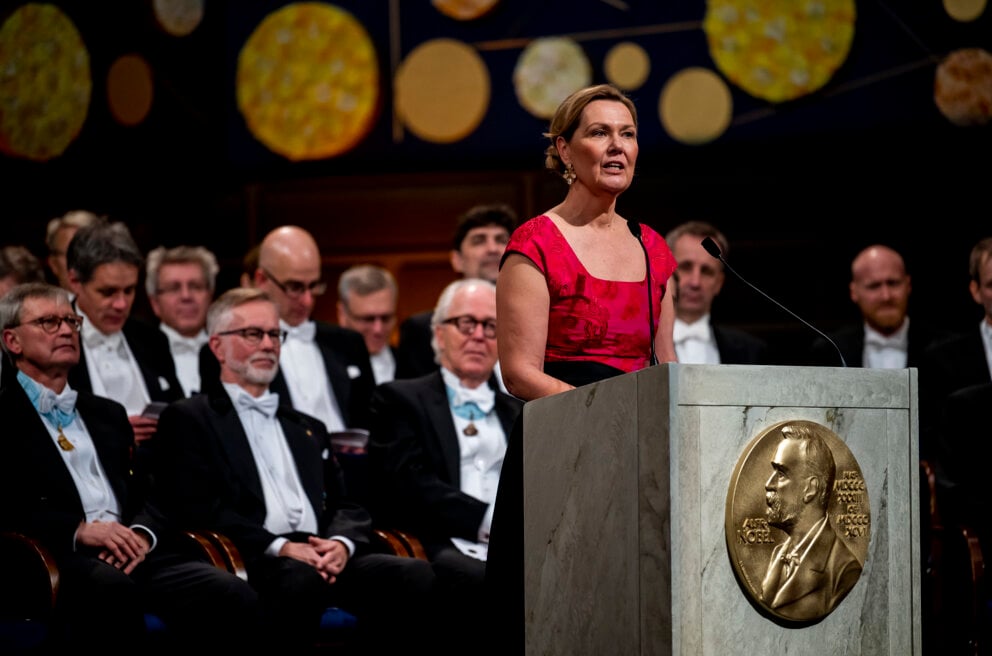Award ceremony speech

Professor Anna Wedell delivering the presentation speech for the 2019 Nobel Prize in Physiology or Medicine at Konserthuset Stockholm, 10 December 2019.
© Nobel Media. Photo: Alexander Mahmoud.
English
Swedish
Presentation Speech by Professor Anna Wedell, Member of the Nobel Assembly at Karolinska Institutet, Adjunct member of the Nobel Committee for Physiology or Medicine, 10 December 2019
Your Majesties, Your Royal Highnesses, Esteemed Nobel Laureates, Ladies and Gentlemen,
Elixir of Life, was the name used in the 1500s for the gas we now know as oxygen.
Air of Fire was the more concise term chosen by Scheele in the 1700s, for the component of air that is needed for burning.
We are all on fire.
We burn our food within our bodies in order to extract energy.
Without oxygen, no energy, no life.
We all know that without oxygen, we die.
What all may not know is, that oxygen deficiency constantly arises within our bodies, for example in our muscles while they work.
This year’s Nobel Prize in Physiology or Medicine concerns how we sense and adapt, in the finest details of our cells, when there is lack of oxygen.
Already at the end of the 1800s we learned that at high altitude, with less oxygen, we adapt by producing more red blood cells.
In the middle of the 1900s we realized that this is mediated by erythropoietin from the kidney. How this regulation works was however not at all understood.
Gregg Semenza and Sir Peter Ratcliffe decided, independently, to find out how the erythropoietin gene can have such an extraordinary ability to react when oxygen levels drop. Semenza discovered an essential DNA element. Ratcliffe was on the same track and they showed that the element is active in all cells. Oxygen sensing thus takes place everywhere in our bodies. Semenza then discovered the critical player that acti- vates our defense genes. It was named HIF. HIF was subjected to an advanced form of control. It is continuously produced, but when oxygen is ample, it disappears. Only when oxygen levels drop, HIF will remain and can mobilise our defense.
William Kaelin studied a different problem, von Hippel- Lindau disease, with inherited increased risk of certain types of cancer. Cancer cells without the gene, VHL, had activated genes normally controlled by HIF. Sir Peter Ratcliffe proved, in a crucial experiment, that VHL is required for HIF to be removed.
But what was the signal to VHL that HIF needs to disappear?
In the early 2000s, Kaelin and Ratcliffe both solved this mystery. The signal was formed by attaching oxygen atoms onto HIF.
Without oxygen, no signal to VHL, HIF is left intact and can activate our defense.
Piece by piece of the puzzle, the Laureates explained a sensitive machinery that compensates when the vital oxygen is not available in exactly the right amount.
Today we know that the machinery affects a vast range of functions.
When oxygen is lacking, oxygen transport is enhanced by generation of new blood vessels and red blood cells. Our cells are also instructed to economize with the oxygen available, by reprogramming their energy metabolism. Oxygen sensing is also involved in many diseases. As a result of the Laureates’ discoveries, intense activities are under way to develop treatments against for example anemia and cancer.
Professors Semenza, Ratcliffe and Kaelin,
Your groundbreaking discoveries have shed light on a beautiful mechanism explaining our ability to sense and react to fluctuating oxygen levels. The system you have clarified is of fundamental importance for all aspects of physiology and for many human diseases. Without it, animal life would not be possible on this planet.
On behalf of the Nobel Assembly at Karolinska Institutet, it is my great privilege to convey to you our warmest congratulations. I now ask you to step forward to receive the Nobel Prize from the hands of His Majesty the King.
Nobel Prizes and laureates
See them all presented here.
